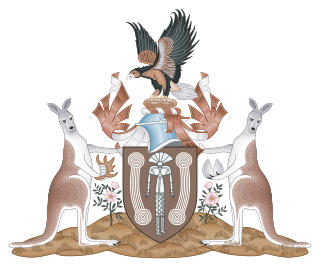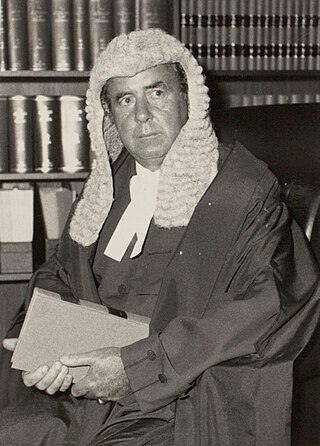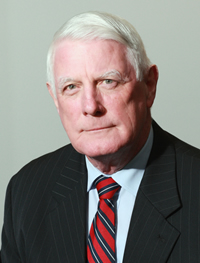Related Research Articles
Sir Harry Talbot Gibbs was Chief Justice of the High Court of Australia from 1981 to 1987 after serving as a member of the High Court between 1970 and 1981. He was known as one of Australia's leading federalist judges although he presided over the High Court when decisions such as Koowarta v Bjelke-Petersen in 1982 and Commonwealth v Tasmania expanded the powers of the Commonwealth at the expense of the states. Gibbs dissented from the majority verdict in both cases. On 3 August 2012, the Supreme Court of Queensland Library opened the Sir Harry Gibbs Legal Heritage Centre. It is the only legal heritage museum of its kind in Queensland and features a permanent exhibition dedicated to the life and legacy of Sir Harry Gibbs.

John Leslie Toohey, AC, QC was an Australian judge who was a Justice of the High Court of Australia from 1987 to 1998.

The Supreme Court of the Northern Territory is the superior court for the Australian Territory of the Northern Territory. It has unlimited jurisdiction within the territory in civil matters, and hears the most serious criminal matters. It is around the middle of the Australian court hierarchy.
Brian Ross Martin is an Australian jurist. He was a judge of the Supreme Court of South Australia before being appointed Chief Justice of the Supreme Court of the Northern Territory in 2004. He served in the Northern Territory between 2004 and 2010. He served as an acting Judge of the Supreme Court of Western Australia in 2012. In legal texts, he is referred to as "Martin (BR) CJ" to avoid confusion with his predecessor.
Sir William Edward Stanley Forster was the first Chief Justice of the Supreme Court of the Northern Territory holding that position from 1979 to 1985. Before that he was the first Chief Judge from 1977 to 1979 and Senior Judge from 1971 to 1977, all positions which were effectively the same.

The law of Papua New Guinea consists of the Constitution, ordinary statutes enacted by Parliament or adopted at independence from overseas and judge-made law.

The Supreme Court of Papua New Guinea has been the highest court of Papua New Guinea since 16 September 1975, replacing the pre-Independence Supreme Court and the overseas appellate tribunals from 1902 to 1975 of the High Court of Australia and the Judicial Committee of the Privy Council. Judges of the pre-Independence Supreme Court automatically became the first justices of the National Court and accordingly among the pool of judges that were available to be empanelled as a Supreme Court bench.
Chief Justice Sir Mari Kapi was a Papua New Guinean judge who served as the fourth Chief Justice of the Supreme Court of Papua New Guinea from 16 August 2003 until his retirement in 2008 for health reasons. Kapi was the first Papua New Guinean citizen to be appointed as a judge and only the third PNG national to be appointed Chief Justice.

The states and territories are the second level of government of Australia. The states are partially sovereign, administrative divisions that are self-governing polities, having ceded some sovereign rights to the federal government. They have their own constitutions, legislatures, executive governments, judiciaries and law enforcement agencies that administer and deliver public policies and programs. Territories can be autonomous and administer local policies and programs much like the states in practice, but are still legally subordinate to the federal government.
Kevin Fredrick O'Leary QC was the second Chief Justice of the Supreme Court of the Northern Territory. He was appointed to that position on 12 September 1985 after James Muirhead had acted in the position following the relocation to Perth of the Territory's first Chief Justice William Forster earlier that year.

James Henry Muirhead AC KStJ QC was an Administrator of the Northern Territory and a Judge of the Supreme Court of the Northern Territory.

The Local Court of the Northern Territory is one of two levels of court in the Northern Territory of Australia. It has jurisdiction in civil disputes up to A$250,000, and in criminal cases in the trial of summary offences, and also deals with preliminary matters for indictable offences which are then heard by the Supreme Court of the Northern Territory. There are local courts held in Darwin, Alice Springs, Katherine, Tennant Creek, and some "bush courts" in remote locations.

Major General Leonard William Roberts-Smith, is a former Justice of the Supreme Court of Western Australia. From February 2005, he was one of the inaugural Judges of the Court of Appeal Division, having been first appointed to the Supreme Court on 6 November 2000. From May 2007, he served as Commissioner of the Corruption and Crime Commission of Western Australia, having been appointed for a five-year term. He retired on 31 January 2011.
The Court of Disputed Returns is a court, tribunal, or some other body that determines disputes about elections in some common law countries. The court may be known by another name such as the Court of Disputed Elections. In countries that derive their legal tradition from the United Kingdom, the legal tradition is that Parliament is the supreme law-making body in the country. The same tradition mandates that as Parliament is sovereign, it alone has authority and jurisdiction to determine who and how a person can be elected to Parliament. Implicit in that authority is the jurisdiction to determine whether a person has been validly elected, which is commonly known as a "disputed return" and gives the court its name. The court is an attempt to eliminate the partisan nature of parliament and give the determination of electoral disputes to an independent and dispassionate neutral body. As parliament has the sole authority to determine these matters, parliament must create a special law to bring that body into existence to determine those disputes.
Jeffrey Allan Miles was an Australian author and jurist. He was a Chief Justice of the Australian Capital Territory. He also held judicial appointments in New South Wales and Papua New Guinea. In 2005 he conducted a judicial review into the fitness to be tried of David Eastman who had been convicted of murdering Australian policeman Colin Winchester. In 2008, he was elected President of the Australian Capital Territory Branch of the International Commission of Jurists.

Sir Richard Arthur Blackburn was an Australian judge, prominent legal academic and military officer. He became a judge of three courts in Australia, and eventually became chief justice of the Australian Capital Territory. In the 1970s he decided one of Australia's earliest Aboriginal Land rights cases. The annual Sir Richard Blackburn Memorial lectures in Canberra commemorate his service to the Australian legal community.
Judith Clair Kelly is a Judge of the Supreme Court of the Northern Territory (Australia). She was appointed to the Court on 12 August 2009. Justice Kelly was only the second female appointment to the Court since it was established in 1911.
Sir John Angus Nimmo was an Australian judge. From 1972 to 1974 he was Chief Justice of Fiji.
The Queen's Birthday Honours 1975 were appointments in many of the Commonwealth realms of Queen Elizabeth II to various orders and honours to reward and highlight good works by citizens of those countries. They were published on 6 June 1975 for the United Kingdom, Australia, New Zealand, Mauritius, Fiji, the Bahamas, and Grenada. These were the last Birthday Honours on the advice of Australian Ministers for Papua New Guinea, as the nation gained independence from Australia on 16 September 1975.
References
- ↑ "Chief Ministers Reception to farewell Brendan Doran DFAT Director Darwin | The Stone Family in Australia". www.stonefamilyinaustralia.com.au. Retrieved 10 August 2019.
- ↑ "Kearney, Hon. Sir William (John Francis)". WHO'S WHO & WHO WAS WHO. doi:10.1093/ww/9780199540884.013.U22688. ISBN 978-0-19-954088-4 . Retrieved 28 September 2020.
- ↑ National Library of Australia. Retrieved 25 June 2017
- 1 2 3 4 5 Supreme Court of NT, Former Judges . Retrieved 25 June 2017
- ↑ It's an Honour: CBE . Retrieved 25 June 2017
- ↑ London Gazette, 12 June 1976 . Retrieved 25 June 2017
- ↑ It's an Honour:Knight Bachelor. Retrieved 25 June 2017
- ↑ London Gazette 49014
- ↑ "The battle for Cox Peninsula – the Kenbi Land Claim 1975 – 2016". The Northern Myth. 20 June 2016. Retrieved 10 August 2019.
- ↑ NT Parliament Hansard, 27 June 1994 . Retrieved 25 June 2017
- ↑ Justice Robert French, Judicial Conference of Australia 2005 Colloquium Papers Judicial Exchange – Debalkanising the Courts, 4 September 2005 . Retrieved 25 June 2017
- ↑ Kearney, Jessie; Giese, Diana (1996). "Lady Jessie Kearney interviewed by Diana Giese". Post-war Chinese Australians Oral History Project.